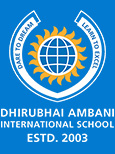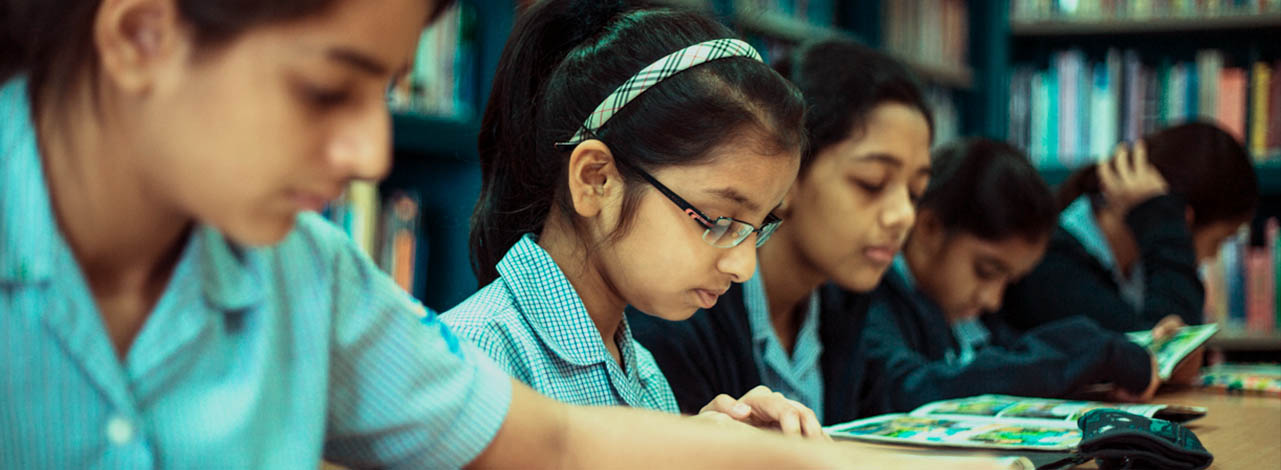The Primary & Middle School Programme
The Primary & Middle School Programme
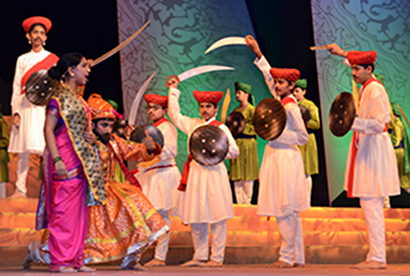 The Primary School Programme at Dhirubhai Ambani International School comprises of Lower and Upper Kindergarten (LKG and UKG) years and Classes I to IV. The Middle School Programme covers Classes V to VII.
The Primary School Programme at Dhirubhai Ambani International School comprises of Lower and Upper Kindergarten (LKG and UKG) years and Classes I to IV. The Middle School Programme covers Classes V to VII.
In classes LKG to VII, the School follows an integrated curriculum, drawing on the programmes of the Council for the Indian School Certificate Examinations and international examination boards. The School is a member of the Cambridge International Primary Programme.
Lower and Upper Kindergarten
(LKG & UKG)
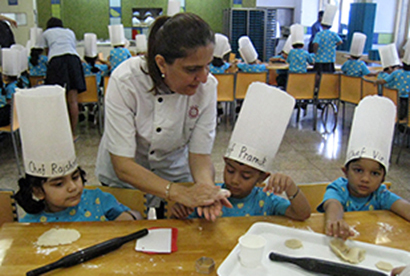 In the Kindergarten classes, emphasis is placed equally on children's intellectual, physical and social development. Children learn through a combination of games, songs and creative projects. They play with blocks; measure sand, water or ingredients for cooking; they are taught to observe changes in the environment, examine and sort objects. Story-telling and role-playing, drawing and tracing, creating patterns and developing skills of measurement: all contribute to the laying of sure foundations in literacy and numeracy.
In the Kindergarten classes, emphasis is placed equally on children's intellectual, physical and social development. Children learn through a combination of games, songs and creative projects. They play with blocks; measure sand, water or ingredients for cooking; they are taught to observe changes in the environment, examine and sort objects. Story-telling and role-playing, drawing and tracing, creating patterns and developing skills of measurement: all contribute to the laying of sure foundations in literacy and numeracy.
In order to make learning both enjoyable and meaningful, the Kindergarten programme:
Classes I to IV
In Classes I to IV, the focus is on encouraging enquiry, exploration and on inculcating confidence in key learning skills - reading, writing, listening, speaking, information technology capability, problem-solving, observation and measurement. Children are encouraged to speak and perform at assemblies, concerts, drama productions, and thus gain confidence in their ability to communicate to a wider audience.
We recognize that children at this level are active, curious, experimental, imaginative, talkative and, above all, disconcertingly frank. Each child is an individual with his or her own unique abilities, interests, aspirations and expectations. Therefore, our curriculum in these classes is structured to encourage and motivate them to become self-confident, self-reliant and self-disciplined, and thus help them achieve their full potential. The School seeks to achieve this through a variety of curricular and co-curricular programmes.
Children learn and develop through
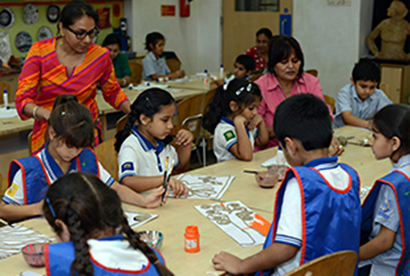
 The Primary School Programme at Dhirubhai Ambani International School comprises of Lower and Upper Kindergarten (LKG and UKG) years and Classes I to IV. The Middle School Programme covers Classes V to VII.
The Primary School Programme at Dhirubhai Ambani International School comprises of Lower and Upper Kindergarten (LKG and UKG) years and Classes I to IV. The Middle School Programme covers Classes V to VII.In classes LKG to VII, the School follows an integrated curriculum, drawing on the programmes of the Council for the Indian School Certificate Examinations and international examination boards. The School is a member of the Cambridge International Primary Programme.
Lower and Upper Kindergarten
(LKG & UKG)
 In the Kindergarten classes, emphasis is placed equally on children's intellectual, physical and social development. Children learn through a combination of games, songs and creative projects. They play with blocks; measure sand, water or ingredients for cooking; they are taught to observe changes in the environment, examine and sort objects. Story-telling and role-playing, drawing and tracing, creating patterns and developing skills of measurement: all contribute to the laying of sure foundations in literacy and numeracy.
In the Kindergarten classes, emphasis is placed equally on children's intellectual, physical and social development. Children learn through a combination of games, songs and creative projects. They play with blocks; measure sand, water or ingredients for cooking; they are taught to observe changes in the environment, examine and sort objects. Story-telling and role-playing, drawing and tracing, creating patterns and developing skills of measurement: all contribute to the laying of sure foundations in literacy and numeracy.
In order to make learning both enjoyable and meaningful, the Kindergarten programme:
- Nurtures the child’s love of learning and fosters the boundless curiosity that comes so naturally at this young age;
- Creates an atmosphere where children feel respected and secure by providing a place of warmth, fun, joy and laughter;
- Focuses on the overall development of children through activities and experiences;
- Offers a flexible and hands-on approach which enables teachers to support children’s interests, build self-esteem and confidence, as well as support the development of skills in all cognitive areas;
- Commits to a curriculum that is dynamic, progressive and responsive to the evolving world, by complementing the Primary School curriculum with that of the Cambridge International Primary Programme;
- Provides a learning environment that encourages children to look at multiple perspectives and develop the ability and attitude to solve their own problems, as well as those of the global community, as they grow up;
- Develops the individual talents and abilities of children and teaches them to connect the experience of the classroom to the realities of the world;
- Caters to the needs of a variety of individual differences within the classroom;
- Offers Games / Physical Education, Western Music, Art and Craft, Speech and Drama, Indian Dance and Yoga as regular curricular subjects;
- Organizes field trips, picnics, celebrations of various festivals and occasions throughout the year.
In Classes I to IV, the focus is on encouraging enquiry, exploration and on inculcating confidence in key learning skills - reading, writing, listening, speaking, information technology capability, problem-solving, observation and measurement. Children are encouraged to speak and perform at assemblies, concerts, drama productions, and thus gain confidence in their ability to communicate to a wider audience.
We recognize that children at this level are active, curious, experimental, imaginative, talkative and, above all, disconcertingly frank. Each child is an individual with his or her own unique abilities, interests, aspirations and expectations. Therefore, our curriculum in these classes is structured to encourage and motivate them to become self-confident, self-reliant and self-disciplined, and thus help them achieve their full potential. The School seeks to achieve this through a variety of curricular and co-curricular programmes.
Children learn and develop through

- A number of informal methods like activities, projects, presentations and hands-on experiences, apart from formal learning;
- Activities like free play, dramatization, enacting through puppets, singing, dancing, cooking, art, and so on;
- Outdoor and indoor play and games;
- Sharing ideas with other children and discovering facts for themselves through observation and reference work;
- Exciting experiential learning opportunities through field trips, which are planned for specific educational purposes;
- Exploring and reading books, newspapers and magazines, thus enhancing their knowledge and inculcating in them an interest to be learning-oriented while appreciating the value of reading and research;
- An appropriate balance of whole group, small group and individual activities, which cater to individual differences in learning;
- An inter-disciplinary appreciation of Language, Mathematics, Social Studies and Science, by studying them as individual subjects as well as in an integrated way;
- Physical education, which improves health and fitness, while enjoying the recreational value it offers;
- Exposure to team and individual sports, competitive and non-competitive, which encourages sportsmanship, a school-wide community spirit and a feeling of individual accomplishment;
-
The ICT Award Computer Course of the University of Cambridge International Examinations, introduces students to the concept and reality of information and communication technology and provides a framework in which practical skills and knowledge can be acquired and developed introduces ‘Cambridge ICT Starters’ exposes students to commonly used key ICT applications. On assessment as per the curriculum guidelines, students progress through the 3 levels – 'Initial steps', 'Next steps' and 'On track'; and may opt to pursue the Cambridge International Diploma in ICT;
- A supportive learning environment where individual needs are addressed in a positive and inclusive way;
- Opportunities in Dance, Fine Arts, Theatre, Western and Indian Music, Speech and Drama and Yoga, which facilitate a well-rounded development. These are part of the regular curriculum, and are also being offered as co-curricular and core activity programmes;
- Participation in co-curricular activities, which are held on Thursdays for one hour. Students who show special interest or are specially talented in any sporting or non-sporting areas are offered further opportunities through the core activity programme, so that they are able to excel in such areas and also enhance their readiness to take part in competitions and tournaments outside of school;
- Celebration of the changing rhythms of the year through a variety of festivals and activities. These are celebrated through whole-school assemblies, play performances, special holidays and functions, which help children in meaningful bonding and appreciation of such festivals;
- As part of their engagement with many social causes, our children from Class III onwards are involved in various community service activities. Children in the primary school visit old age homes, orphanages and support underprivileged children.
- In Classes V-VII, students build on the foundations laid in the primary school. New challenges are met as communication, reasoning, problem - solving and value judgment become far more complex;
- Our aim is to provide a broad-based curriculum which facilitates in-depth study of the key elements of English, Hindi, Marathi, Mathematics, Science, History, Geography, Art, Computer Studies, Music, Yoga, Dance, Drama, Physical Education and Personal Social and Health Education (PSHE);
- A detailed curricular framework is formulated, which is a blend of both the Cambridge International Primary Programme (which continues up to Class V) and the Indian Council of Secondary Education Curriculum. This framework ensures progression and continuity through the school and avoids repetition;
- The middle school continues the ICT Award Computer Course of the Cambridge International Programme for the students up to Class VII;
- The Arts are a fundamental means of expression and communication in all societies, and hence to give children access to the cultural diversity and traditions that constitute artistic heritage, the School continues to provide a comprehensive Arts programme. Thus, the middle school children participate in Music, Art, Dance, Yoga, Drama and other activities during their regular class time as well as co-curricular activities; they also take part in core activity programmes (sporting and non-sporting), which are conducted before or after school hours;
- The educational philosophy of the School encourages children to get a wide range of first-hand experiences. Much of our work is focused on the environment and therefore school trips are a vital part of the curriculum;
- The evaluation system in the middle school is such that each child feels that he or she has made progress and shown positive achievement and success. The school follows a policy of awarding grades rather than marks for individual components of work. There is continuous evaluation of a child’s performance in class, and students' performance and grades are monitored and reviewed throughout the year to facilitate their continued progress.
